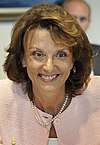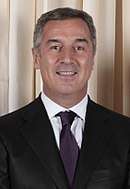Democratic Party of Socialists of Montenegro
The Democratic Party of Socialists of Montenegro (Montenegrin: Demokratska partija socijalista Crne Gore / Демократска партија социјалиста Црне Горе, DPS) is a catch-all and populist[2] political party in Montenegro, which has been in power since the introduction of multi-party system in 1990.
Democratic Party of Socialists Демократска партија социјалиста Demokratska partija socijalista | |
|---|---|
 | |
| President | Milo Đukanović[1] |
| Deputy President | Duško Marković |
| Founders | Momir Bulatović Milo Đukanović Svetozar Marović |
| Founded | 22 June 1991 |
| Preceded by | League of Communists |
| Headquarters | Podgorica |
| Ideology | Contemporary: Populism[2] Catch-all party[3][4] Montenegrin nationalism[2][5] Pro-Europeanism[6] Atlanticism[6] Economic liberalism[6] Historical: Democratic socialism Social democracy[7] Serbian-Montenegrin unionism |
| Political position | Centre[8] to centre-left[9] |
| European affiliation | Party of European Socialists (associate) |
| International affiliation | Progressive Alliance[10] Socialist International[11] |
| Colours | Orange Blue Red |
| Parliament | 35 / 81 |
| Local Parliaments | 357 / 786 |
| Website | |
| www | |
The party was formed in 1991 as the successor of the League of Communists of Montenegro, which had governed Montenegro within the Yugoslav federation since World War II. Since its formation and the introduction of a multi-party system, the DPS has played a dominant role in Montenegrin politics, forming the backbone of every coalition government to date.
At the 2012 legislative elections held on 14 October, the DPS along with the Social Democratic Party of Montenegro (SDP) as the Coalition for a European Montenegro won 39 out of 81 seats. This coalition, along with its longtime partner the Bosniak Party, once again formed a majority in the Parliament of Montenegro and held the right to appoint the Government. The DPS itself won 31 seats. The current Prime Minister of Montenegro Duško Marković and President Milo Đukanović are both members of the party.
The DPS is internationally affiliated with the Socialist International and Progressive Alliance, and is an associate affiliate of the Party of European Socialists.
Ideology
The party evolved from the League of Communists of Montenegro as a reformist force after Yugoslavia's dissolution. In the 1990s, party was based on democratic socialism, social democracy and Serbian–Montenegrin unionism. In the 2000s, the party switched policy towards a common state with Serbia and would become the main proponent of the independence of Montenegro in 2006. Today's party is characterized by populist[2] big tent politics with a slight centre-left[9] lean, alongside elements of nationalism[12], a pro-western stance towards European integration,[7] and some Third Way economics.
History
Background
The history of the DPS begins with the political turmoil in Yugoslavia in the late 1980s. After Slobodan Milošević seized power in the League of Communists of Serbia, he went on to organize rallies that eventually ousted the leaderships of the League of Communists of Yugoslavia local branches in Vojvodina, Kosovo and Montenegro. This series of events, collectively known as the Anti-bureaucratic revolution, swept into power new party leadership in Montenegro, one allied with Milošević, personified in Momir Bulatović, Milo Đukanović and Svetozar Marović.
The League of Communists of Montenegro, under this new leadership, won by a landslide in the first relatively free multi-party election in Socialist Montenegro, held in December 1990, taking 83 out of 125 seats in the Montenegrin parliament. The party had a significant head start in the elections, as it had the entire established party structure at its disposal, while newly formed competition had to start from scratch. The party changed its name to the Democratic Party of Socialists on 22 June 1991.
With Bulatović as the president, the DPS closely aligned Montenegro with Serbia and the policies of Slobodan Milošević. The party was firmly in power during the turbulent early 1990s, which saw the dissolution of Yugoslavia and the beginning of the Yugoslav Wars. During these years, the party endorsed a union and close relations with Serbia (its sole partner in the Federal Republic of Yugoslavia from 1992). The party maintained the support of the electorate in this difficult period for Montenegro, winning both the 1992 and 1996 elections.
Split between Bulatović and Đukanović
On July 11, 1997, the party's national committee ("Glavni odbor", abbreviated as "GO") held a closed doors session after which the committee selected Milica Pejanović-Đurišić to replace Bulatović as the party president.[13] The party split had enormous implications, making a political confrontation between Đukanović and Bulatović inevitable. This manifested in the 1997 Montenegrin presidential election held in October, which Đukanović won by a thin margin.
Bulatović went on to form the Socialist People's Party of Montenegro (SNP) out of his defeated DPS faction, whose platform held a unionist position on the question of Yugoslavia and its short-lived successor state, Serbia and Montenegro. Meanwhile, Đukanović became a fierce opponent of Milošević. As a result of Đukanović's relationship with the United States, Montenegro received significant amounts of economic aid during this period, and negotiated limitations on NATO bombings of its territory in 1999, whereas the rest of Yugoslavia was subject to significantly heavier attacks. The DPS government gradually severed ties with Serbia by taking control over customs and the economy, introducing first the German mark, and subsequently the Euro as legal tender, and generally reducing the influence of the federal government in Montenegro.
Montenegrin independence
Following the overthrow of Slobodan Milošević on 5 October 2000, the DPS showed signs of greater support for Montenegrin independence. The campaign for the 2002 parliamentary elections was devoted to the question of Montenegro's independence. However EU mediated negotiations between the DPS and the newly elected democratic government in Serbia in 2003 imposed a three-year waiting period before an independence referendum could be held. The transitional period saw the transformation of the FR Yugoslavia to a loose union called Serbia and Montenegro. During the existence of the union state, the party congress added the goal of a "democratic, internationally-recognized, independent Montenegro" to its official platform.[14] The party then spearheaded the pro-independence campaign ahead of Montenegro's referendum in 2006. With 55.5% of voters opting for independence, Montenegro became an independent state on 3 June 2006.
Post-referendum era
In 2006 at the first parliamentary elections in independent Montenegro, as well as the subsequent elections in 2009 and 2012, the DPS confirmed its position as the strongest political party in Montenegro. The party has formed the basis of all parliamentary majorities and has been the backbone of all Government cabinets since independence, usually with its now traditional ally the Social Democratic Party of Montenegro (SDP) and ethnic minority parties.
Party vice president Filip Vujanović is incumbent President of Montenegro, currently serving his third term, having won presidential elections in 2003, 2008 and 2013.
Milo Đukanović remains the party president and its undisputed authority, serving either as Prime Minister or President of Montenegro from 1991 to 2006, 2008 to 2010 and 2012 to 2016. In 2006, the party leadership chose Željko Šturanović, former Minister of Justice, to succeed Đukanović as Prime Minister, until his resignation on 31 January 2008 for health reasons, whereupon Đukanović replaced him, only to resign again in December 2010 while retaining his role as DPS party leader.[1] After winning the 2012 parliamentary elections, Đukanović once again assumed the position of Prime Minister.
Presidents of Democratic Party of Socialists
| # | President | Age | Term start | Term end | |
|---|---|---|---|---|---|
| 1 | Momir Bulatović | .jpg) | 1956–2019 | 22 June 1991 | 19 October 1997 |
| 2 | Milica Pejanović |  | b. 1959 | 19 October 1997 | 31 October 1998 |
| 3 | Milo Đukanović |  | b. 1962 | 31 October 1998 | Incumbent |
Electoral performance
Parliamentary elections
| Year | Popular vote | % of popular vote | Overall seats won | Seat change | Alliance | Government | Leader |
|---|---|---|---|---|---|---|---|
| 1990 | 171,316 | 56.18% | 83 / 125 |
— | Majority | Momir Bulatović | |
| 1992 | 126,083 | 42.66% | 46 / 75 |
— | Majority | Momir Bulatović | |
| 1996 | 150,237 | 49.92% | 45 / 75 |
— | Majority | Momir Bulatović | |
| 1998 | 170,080 | 48.87% | 32 / 75 |
ECG | Coalition | Milo Đukanović | |
| 2001 | 153,946 | 42.04% | 30 / 75 |
ECG | Coalition | Milo Đukanović | |
| 2002 | 167,166 | 48.0% | 31 / 75 |
ECG | Coalition | Milo Đukanović | |
| 2006 | 164,737 | 48.62% | 32 / 81 |
ECG | Coalition | Milo Đukanović | |
| 2009 | 168,290 | 51.94% | 35 / 81 |
ECG | Coalition | Milo Đukanović | |
| 2012 | 165,380 | 45.60% | 32 / 81 |
ECG | Coalition | Milo Đukanović | |
| 2016 | 158,490 | 41.41% | 35 / 81 |
— | Coalition | Milo Đukanović | |
Presidential elections
| Election year | Candidate | # | 1st round votes | % of votes | # | 2nd round votes | % of votes |
|---|---|---|---|---|---|---|---|
| 1990 | Momir Bulatović | 1st | 170,092 | 42.22% | 1st | 203,616 | 76.1 |
| 1992 | Momir Bulatović | 1st | 123,183 | 42.8% | 1st | 158,722 | 63.4 |
| 1997 | Milo Đukanović | 2nd | 145,348 | 46.71% | 1st | 174,745 | 50.79 |
| 2003 | Filip Vujanović | 1st | 139,574 | 64.2% | N/A | — | — |
| 2008 | Filip Vujanović | 1st | 171,118 | 51.89% | N/A | — | — |
| 2013 | Filip Vujanović | 1st | 161,940 | 51.21% | N/A | — | — |
| 2018 | Milo Đukanović | 1st | 180,274 | 53.90% | N/A | — | — |
FRY and Serbia and Montenegro
| Year | Popular vote | % of popular vote | Seats | Montenegrin seats | ± | Government | Carrier |
|---|---|---|---|---|---|---|---|
| 1992 | 160,040 | 68.6% | 23 / 136 |
23 / 30 |
Coalition | Miloš Radulović | |
| 1993 | 130,431 | 47.3% | 17 / 138 |
17 / 30 |
Coalition | Radoje Kontić | |
| 1996 | 146,221 | 50.8% | 20 / 138 |
20 / 30 |
Coalition | Radoje Kontić | |
| 2000 | Election boycott | 0 / 138 |
0 / 30 |
Election boycott | |||
Positions held
Major positions held by Democratic Party of Socialists of Montenegro members:
|
Heads of Federal offices of Yugoslavia and
|
|
References
- The end of an era, possibly (accessed 24 December 2010)
- Dzankic, Jelena (2017). "State-sponsored Populism and the Rise of Populist Governance - The Case of Montenegro" (PDF). Journal of Balkan and Near Eastern Studies. Retrieved 13 November 2018.
- Berglund, Sten (2013). The Handbook of Political Change in Eastern Europe. Springer. p. 568.
- Vujović, Zlatko (2015). Electoral and Party System in Montenegro – A Perspective of Internal Party Democracy Development. Center for Monitoring and Research. p. 162.
- Polackova, Zuzana (2017). "Independence lost and regained: Montenegro's contested identity and the failure of Yugoslavia (1918-2006)" (PDF). Journal of Balkan and Near Eastern Studies. Retrieved 13 November 2018.
- "Politički program DPS VIII kongres" (PDF). November 30, 2019.
- Nordsieck, Wolfram (2016). "Montenegro". Parties and Elections in Europe. Retrieved 4 July 2018.
- Strmiska, Maxmilián (2000). "The Making of Party Pluralism in Montenegro". Masaryk University. Retrieved 2019-05-23.
- "Montenegro elects new/old president". n1info.com. 2018-04-16. Retrieved 2019-05-23.
- "Parties & Organisations". Progressive Alliance. Retrieved 22 July 2019.
- "Full list of member parties and organisations". Socialist International. Retrieved 22 July 2019.
- Morrison, Kenneth (2009). Nationalism, Identity and Statehood in Post-Yugoslav Montenegro. London: I.B. Tauris & Co Ltd. ISBN 978-1-84511-710-8.CS1 maint: ref=harv (link)
- "Kako su se "razveli" Milo i Momir: Dve decenije od sednice na kojoj se pocepao DPS". Nedeljnik (in Serbian). July 11, 2017. Retrieved February 14, 2019.
- Samir Kajošević (January 22, 2015). "DPS na kongresu mijenja program". Vijesti (in Serbian).